
Microbiome
Scope & Guideline
Exploring the Hidden Forces of Health
Introduction
Aims and Scopes
- Microbiome-Host Interactions:
Explores how microbiomes interact with their hosts, influencing health and disease outcomes, with a focus on mechanisms of interaction and functional implications. - Nutritional and Dietary Impacts:
Investigates how different diets and nutritional strategies affect the composition and function of microbiomes in various animal species, emphasizing the role of specific dietary components. - Microbial Dynamics and Ecology:
Analyzes the dynamics of microbial communities in response to environmental changes, host factors, and management practices, contributing to our understanding of microbial ecology. - Antimicrobial Resistance and Health:
Examines the emergence and transmission of antimicrobial resistance within microbiomes, particularly in agricultural settings, and its implications for animal and public health. - Application of Omics Technologies:
Utilizes advanced omics technologies (metagenomics, metabolomics, etc.) to characterize microbiomes and their functional capabilities, driving innovations in animal health and nutrition. - Conservation and Biodiversity:
Addresses the role of microbiomes in conservation efforts, particularly in threatened and endangered species, highlighting their importance in ecological resilience.
Trending and Emerging
- Microbiome and Immunity:
There is a growing interest in understanding the relationship between microbiomes and immune responses, particularly how microbiota composition influences host immunity under various conditions. - Microbiome in Aquaculture:
Research on microbiomes in aquatic species, particularly in aquaculture, is trending, emphasizing the role of microbiota in health, growth performance, and disease resistance in fish. - Cross-Species Microbiome Comparisons:
Emerging studies are increasingly comparing microbiomes across different species to identify conserved functions and ecological roles, providing insights into evolutionary biology. - Environmental Influences on Microbiomes:
Investigations into how environmental factors, such as urbanization and climate change, impact microbial communities are gaining momentum, reflecting broader ecological concerns. - Microbiome in Wildlife Conservation:
There is an increasing focus on the role of microbiomes in wildlife conservation efforts, particularly in understanding how microbiota contribute to the health and survival of endangered species. - Integration of AI and Machine Learning:
The application of artificial intelligence and machine learning in analyzing microbiome data is emerging, enhancing predictive modeling and understanding of complex microbiome interactions.
Declining or Waning
- Traditional Antibiotic Studies:
Research focused on the effects of traditional antibiotics on microbiomes appears to be waning, likely due to a shift towards exploring alternative health interventions and the implications of antibiotic resistance. - Single-Species Microbial Studies:
The emphasis on studies involving single-species microbiota is decreasing as the field moves towards more complex, multi-species interactions and ecological dynamics. - Static Microbiome Profiles:
There is a decline in studies that present static profiles of microbiomes without exploring their functional capacities or dynamics, reflecting a broader interest in understanding microbiome adaptability. - Host-Only Studies:
Research that exclusively examines host factors without consideration of the microbiome is becoming less prevalent, as the interconnectedness of hosts and their microbiomes gains more recognition. - Simplistic Dietary Impact Assessments:
The simplicity of dietary impact assessments on microbiomes is declining, with a growing preference for comprehensive studies that consider multiple dietary components and their interactions.
Similar Journals

Advancements of Microbiology
Pioneering Innovations in Microbiology ResearchAdvancements of Microbiology, published by the Polish Society of Microbiologists, serves as a vital resource for researchers and professionals in the field of microbiology. With an ISSN of 0079-4252 and an E-ISSN of 2545-3149, this esteemed journal provides Open Access content, facilitating the dissemination of innovative scientific research since 2018. Although coverage in Scopus has been discontinued since 2018, the journal is recognized for its historical contributions, ranging from 1973 to 1982 and 1999 to 2018. Positioned within the Microbiology (medical) category, it currently ranks #97 out of 110, while its standing in Immunology and Microbiology reflects a rank of #127 among 140 journals. Advancements of Microbiology emphasizes cutting-edge findings and applications, catering to an audience dedicated to advancing knowledge and practice in the ever-evolving microbiological landscape.
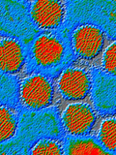
Annual Review of Microbiology
Connecting Research to Real-World Applications in MicrobiologyAnnual Review of Microbiology is a preeminent academic journal published by Annual Reviews, specializing in the dynamic field of microbiology. With a rich history dating back to 1948, this journal has become a vital resource for researchers, professionals, and students alike, providing comprehensive reviews that synthesize the latest advancements and trends in microbiological research. The journal is renowned for its impressive reputation, holding a Q1 ranking in both Medicine (miscellaneous) and Microbiology, and achieving an outstanding Scopus rank of #12 out of 182 in the field, placing it in the 93rd percentile. Although it does not offer open access, the Annual Review of Microbiology remains integral to advancing knowledge and understanding of microbial science, helping to bridge the gap between fundamental research and practical applications in health, industry, and environmental sustainability. Its meticulously curated content serves as a crucial platform for fostering innovation and collaboration among the global research community.
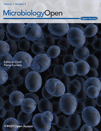
MicrobiologyOpen
Empowering discovery and collaboration in microbiology.MicrobiologyOpen is a prestigious, open access journal published by WILEY, dedicated to advancing the field of microbiology. Since its inception in 2012, this journal has firmly established itself as a significant platform for researchers, professionals, and students alike, facilitating the dissemination of high-quality research findings across a wide range of microbiological disciplines. With an impressive impact factor and a ranking in the 76th percentile of Scopus for immunology and microbiology, MicrobiologyOpen offers a robust forum for innovative studies, reviews, and compelling insights that push the boundaries of scientific understanding. The journal's commitment to open access ensures that groundbreaking research is freely available to the global community, fostering collaboration and knowledge-sharing. As it continues to evolve until 2024, MicrobiologyOpen remains pivotal for anyone looking to stay at the forefront of microbiological research.

CURRENT MICROBIOLOGY
Elevating Knowledge in the World of MicrobiologyCURRENT MICROBIOLOGY, published by SPRINGER, is a renowned journal that serves as a critical platform for the dissemination of cutting-edge research in the field of microbiology. With an ISSN of 0343-8651 and an E-ISSN of 1432-0991, this journal contributes significantly to the scientific community by covering a diverse range of topics from applied microbiology and biotechnology to various aspects of medicine. Currently operating an impact factor that places it within the Q2 quartile in both applied microbiology and biotechnology and medicine (miscellaneous), along with a Q3 ranking in microbiology, CURRENT MICROBIOLOGY is recognized for its valuable contributions to these dynamic fields. This journal, which has documented the evolution of microbiological research since its inception in 1978, provides an essential venue for researchers, professionals, and students alike to explore innovative studies and advances. Although it does not offer open access, the journal remains a pivotal resource within its category, complementing the ongoing growth and exploration of microbiology from its headquarters at One New York Plaza, Suite 4600, New York, NY 10004, United States. Its Scopus rankings highlight its reputable standing, making it a key publication for anyone aiming to stay at the forefront of microbiological science.
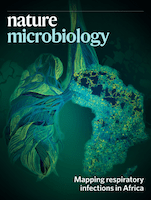
Nature Microbiology
Exploring Innovations in Applied MicrobiologyNature Microbiology is a premier journal published by NATURE PORTFOLIO that has firmly established itself within the realms of microbiological research since its inception in 2016. Based in the United Kingdom, this prestigious journal specializes in the intricacies of applied microbiology, cell biology, genetics, immunology, and medical microbiology, making it a cornerstone for academics and professionals alike. With an impressive Scopus ranking placing it in the top tier across various relevant categories—such as rank #3 in Genetics and #2 in Applied Microbiology—it underscores the journal’s commitment to high-quality, impactful research. Although it operates under a subscription model, Nature Microbiology's broad Open Access policy facilitates greater dissemination and visibility for its authors. The journal's objectives are centered around publishing cutting-edge advancements that enhance our understanding of microbial life, its interactions, and applications in health and disease. As a Q1 journal across multiple disciplines, it holds immense significance for researchers, professionals, and students enthusiastic about the latest innovations and breakthroughs in microbiology.
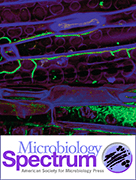
Microbiology Spectrum
Exploring the vast landscape of microbial science.Microbiology Spectrum is a prominent peer-reviewed journal published by the American Society for Microbiology, dedicated to advancing the field of microbiology through the dissemination of high-quality research. Since its inception in 2013 and continuing until 2024, the journal has established a strong presence in key domains such as microbiology, immunology, cell biology, and ecology, achieving impressive quartile rankings including Q1 in Infectious Diseases and Q1 in Immunology and Microbiology as of 2023. With an emphasis on open access to its scholarly content, Microbiology Spectrum aims to foster collaboration and knowledge sharing among researchers, professionals, and students alike. The journal's scope encompasses a diverse range of topics pertinent to the field, making it an essential resource for anyone involved in microbiological research and its applications. Researchers looking to publish their findings in a respected journal will find Microbiology Spectrum's robust impact factor and Scopus rankings serve as testament to its significance and influence within the academic community.

TRENDS IN MICROBIOLOGY
Pioneering Reviews that Shape Microbiology's FutureTRENDS IN MICROBIOLOGY is a premier academic journal published by CELL PRESS, renowned for its high-impact research contributions in the fields of microbiology, infectious diseases, medical microbiology, and virology. With an impressive impact factor and a notable Scopus ranking—placing it in the top tiers of its categories, including a remarkable Q1 status in multiple disciplines—this journal is essential for researchers, professionals, and students aiming to stay at the forefront of innovative microbial research and ongoing advancements in pathogen biology. Since its inception in 1993, TRENDS IN MICROBIOLOGY has provided a platform for thought-provoking reviews and critical insights, fostering discussions that shape the future of the microbiological sciences. Based in the United Kingdom, TRENDS IN MICROBIOLOGY continues to lead the way in disseminating vital knowledge within the global scientific community.

AIMS Microbiology
Unlocking the mysteries of microbes, one study at a time.AIMS Microbiology, published by the American Institute of Mathematical Sciences (AIMS), is an esteemed Open Access journal dedicated to advancing the field of microbiology since its inception in 2015. With an ISSN of 2471-1888, the journal aims to disseminate high-quality research and innovative findings pertaining to both fundamental and applied microbiology, encompassing areas such as medical microbiology, immunology, and related life sciences. Recognized for its academic rigor, AIMS Microbiology has achieved a significant standing, evidenced by its current Q2 ranking in both Microbiology and Medical Microbiology categories, along with impressive percentile rankings within prestigious Scopus metrics. Based in the United States, the journal not only emphasizes accessibility and widespread dissemination of knowledge but also plays a crucial role in fostering collaboration among researchers and professionals in the microbiological sciences. By providing a platform for collaborative research and innovative ideas, AIMS Microbiology is poised to influence the future development and application of microbiological research, making it a valuable resource for students, researchers, and practitioners alike.

mSphere
Connecting researchers to the forefront of microbiological discovery.mSphere is a leading open-access journal published by the American Society for Microbiology, dedicated to the dynamic fields of Microbiology and Molecular Biology. Since its inception in 2016, mSphere has rapidly established itself as a reputable source of scholarly research, achieving notable impact factors and excellence within the academic community. The journal ranks in the top quartile (Q1) amongst its peers in Microbiology, and Q2 in the field of Molecular Biology, demonstrating its significance and relevance through Scopus rankings—specifically, it holds the #42 spot out of 182 in the Microbiology category and #108 out of 410 in Molecular Biology. With an editorial commitment to advancing the understanding of microbial and molecular sciences, mSphere provides an accessible platform for researchers, professionals, and students alike to disseminate groundbreaking findings. The journal promotes rigorous peer-review and invites innovative contributions aimed at enhancing microbial research mobility and molecular exploration. Accessible openly since 2016, mSphere continues to thrive as an influential publication driving scientific dialogue and discovery in the microbiological sciences.
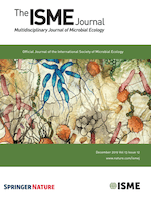
ISME Journal
Advancing knowledge at the intersection of life sciences.The ISME Journal, published by Oxford University Press, stands as a premier multidisciplinary platform dedicated to advancing the fields of Ecology, Evolution, Behavior, and Systematics as well as Microbiology. With its ISSN of 1751-7362 and E-ISSN 1751-7370, this renowned journal has successfully maintained a prestigious reputation reflected in its commendable Q1 rankings across both fields in 2023. It ranks #7 out of 721 in Ecology, Evolution, Behavior, and Systematics and #8 out of 182 in Microbiology, placing it in the top percentiles of relevant Scopus categories. Covering original research, reviews, and methodologies, the journal aims to foster interdisciplinary collaboration and inspire new paradigms in microbiome research, environmental processes, and evolutionary dynamics. Researchers, professionals, and students are encouraged to submit their findings to a journal that not only reaches a global audience but also influences the direction of ongoing scientific discourse. With a commitment to excellence, the ISME Journal represents an essential resource for anyone engaged in these transformative fields of study.